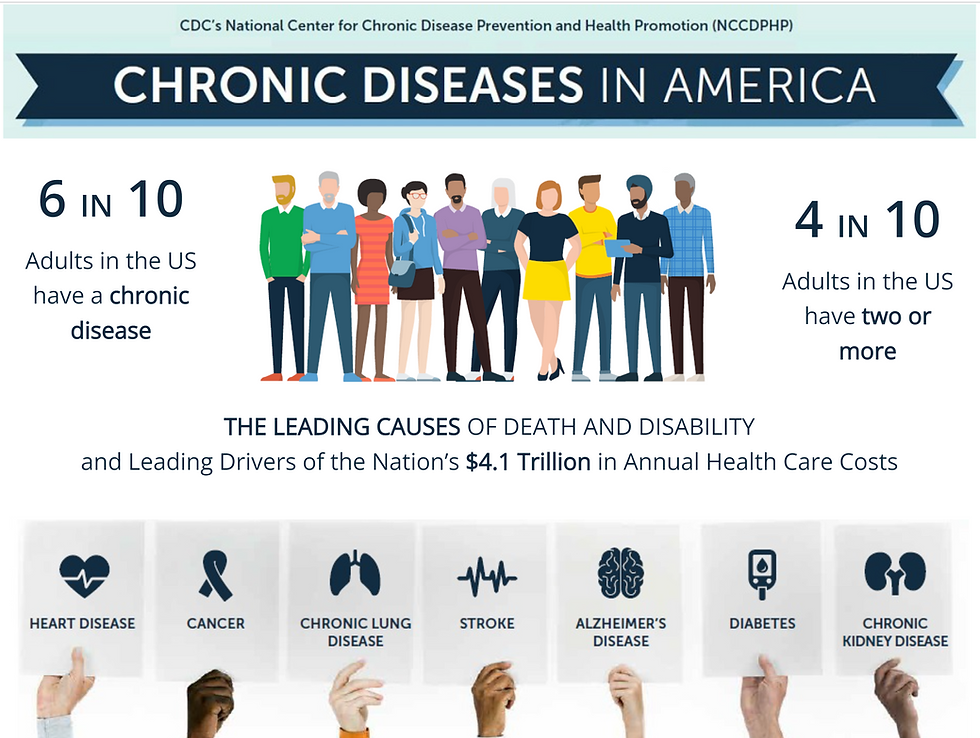Understanding Medicine Practice Modalities: A Path to Better Health
- Mar 30, 2023
- 3 min read
Updated: Feb 18
Medicine practice modalities can often feel overwhelming and complex. With various approaches available, it’s essential to understand how they differ and which may be best suited for different health concerns. This article provides clarity on these modalities and highlights a growing shift toward holistic and evidence-based care.
The Strengths and Limitations of Conventional Medicine

Western (conventional) medicine has made remarkable strides in controlling infectious diseases and managing acute traumas and emergencies. However, when it comes to chronic diseases, its approach is often less effective. In fact, chronic and mental health conditions account for 90% of the nation’s $4.1 trillion in annual healthcare expenditures (CDC). Globally, 80% of total deaths are related to chronic diseases (World Economic Forum, 2010).
To better address chronic conditions, healthcare practitioners are integrating additional modalities that focus on prevention and root-cause treatment. One such approach, Lifestyle Medicine, has gained widespread recognition for its ability to not only manage but, in many cases, reverse chronic diseases through evidence-based interventions.

Exploring Different Medicine Practice Modalities
Below are key medicine practice modalities, their descriptions, and their role in patient care:
Allopathic Medicine - Allopathic medicine is a system in which medical doctors and other healthcare professionals (such as nurses, pharmacists, and therapists) treat symptoms and diseases using drugs, radiation, or surgery. Also called biomedicine, conventional medicine, mainstream medicine, orthodox medicine, and Western medicine.
Preventive Medicine - Preventive medicine is the practice of promoting preventive health care to improve patient well-being. The goal is to ultimately prevent disease, disability, and death by early detection and screening. If chronic disease is detected, in most cases, preventive medicine practitioners use allopathic medicine to treat conditions.
Integrative Medicine - An approach to medical care that recognizes the benefit of combining conventional (standard) therapies (such as drugs and surgery) with complementary and alternative therapies (such as acupuncture and yoga) that have been shown to be safe and effective.
Functional Medicine - Functional medicine uses specialized training and techniques to find the root causes of complex illnesses. They may investigate multiple factors causing a condition, or they may look into multiple conditions causing one symptom. A doctor in functional medicine works holistically, considering the full picture of your physical, mental, emotional, and sometimes even spiritual health. They consider factors like diet, genetics, hormonal changes, prescription and over the counter medications, and other lifestyle components.
Lifestyle Medicine - Lifestyle medicine is a medical specialty that uses therapeutic lifestyle interventions as a primary modality to treat chronic conditions. It is based on evidence-based, whole-person, prescriptive lifestyle change to treat and, when used intensively, often reverse such conditions. Also, provide effective prevention strategies when applying the six pillars of lifestyle medicine—a whole food, plant-predominant eating pattern, physical activity, restorative sleep, stress management, avoidance of risky substances and positive social connections.
Lifestyle Medicine vs. Functional Medicine: Understanding the Difference
While both Lifestyle Medicine and Functional Medicine seek to address the root cause of disease, they differ in approach:
Functional medicine incorporates the use of novel diagnostic blood work, nutraceuticals and supplements to treat the illness in addition to the holistic approach.
Lifestyle medicine prioritizes whole-food nutrition and behavioral changes as the approach to get to the root cause and treat (in cases reverse) the illness. Lifestyle medicine only uses supplements as necessary. A healthy balanced meal should provide all minerals and vitamins the body needs.
Empowering Patients Through Lifestyle Medicine
One of the most significant aspects of Lifestyle Medicine is the active role patients take in their healing journey. This approach empowers individuals to take charge of their health, fostering confidence and long-term wellness. It’s a collaborative effort between patients and practitioners, requiring engagement and commitment to lifestyle changes.
Looking Ahead: Practical Lifestyle Recommendations
In the next Health & Lifestyle blog, we will explore commonly agreed lifestyle recommendations from various health associations and institutions. These insights will provide practical guidance on incorporating evidence-based strategies for optimal well-being.
By understanding different medical approaches, individuals can make informed choices about their health and well-being, ensuring they receive the most effective care tailored to their needs.
With Unconditional Love,
Coach Edna

Ready to start your journey to an Empowered WellBeing w/Coach Edna?
Was this blog informative? Do you want to know more about this or other health & lifestyle topic? Leave a comment below or contact me. I'll be happy to answer and/or provide additional information.

コメント